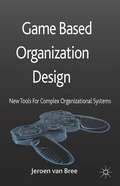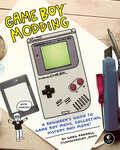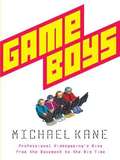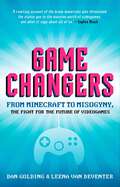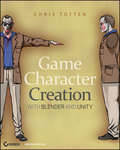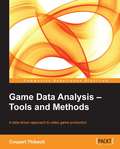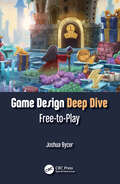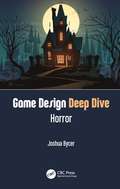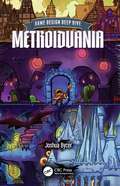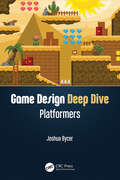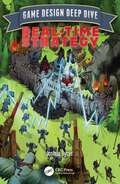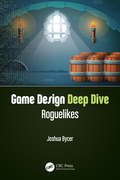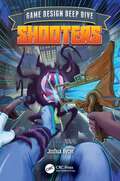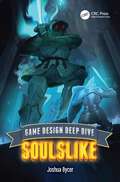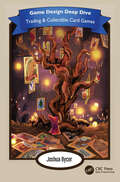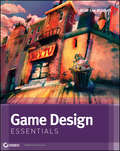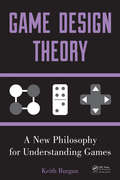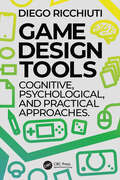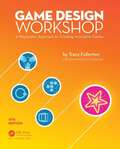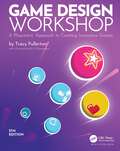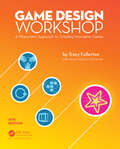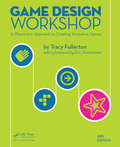- Table View
- List View
Game Balance
by Ian Schreiber Brenda RomeroWithin the field of game design, game balance can best be described as a black art. It is the process by which game designers make a game simultaneously fair for players while providing them just the right amount of difficulty to be both exciting and challenging without making the game entirely predictable. This involves a combination of mathematics, psychology, and occasionally other fields such as economics and game theory. Game Balance offers readers a dynamic look into game design and player theory. Throughout the book, relevant topics on the use of spreadsheet programs will be included in each chapter. This book therefore doubles as a useful reference on Microsoft Excel, Google Spreadsheets, and other spreadsheet programs and their uses for game designers. FEATURES The first and only book to explore game balance as a topic in depth Topics range from intermediate to advanced, while written in an accessible style that demystifies even the most challenging mathematical concepts to the point where a novice student of game design can understand and apply them Contains powerful spreadsheet techniques which have been tested with all major spreadsheet programs and battle-tested with real-world game design tasks Provides short-form exercises at the end of each chapter to allow for practice of the techniques discussed therein along with three long-term projects divided into parts throughout the book that involve their creation Written by award-winning designers with decades of experience in the field Ian Schreiber has been in the industry since 2000, first as a programmer and then as a game designer. He has worked on eight published game titles, training/simulation games for three Fortune 500 companies, and has advised countless student projects. He is the co-founder of Global Game Jam, the largest in-person game jam event in the world. Ian has taught game design and development courses at a variety of colleges and universities since 2006. Brenda Romero is a BAFTA award-winning game director, entrepreneur, artist, and Fulbright award recipient and is presently game director and creator of the Empire of Sin franchise. As a game director, she has worked on 50 games and contributed to many seminal titles, including the Wizardry and Jagged Alliance series and titles in the Ghost Recon, Dungeons & Dragons, and Def Jam franchises.
Game Based Organization Design
by Jeroen Van BreeThere is a widening gap between the current organizational reality and the tools and methods available to managers for addressing its challenges. Game Based Organization Design shows that one of the ways to bridge this gap is to introduce insights and approaches from video game design into the design of organizational systems.
Game Boy Modding: A Beginner's Guide to Game Boy Mods, Collecting, History, and More!
by Greg FarrellComplete beginner's guide to all aspects of modifying the classic Nintendo Game Boy.Game Boy Modding teaches you how to purchase, refurbish, mod, and customize Nintendo handheld consoles. The consoles are widely available and the customizations are affordable, requiring only limited tools and know-how. Retro consoles are seeing a resurgence of popularity worldwide, and king among these throwback devices is the Nintendo Game Boy, which sold over 100 million units in its lifetime and introduced gamers to Mario and Pokemon. These consoles emanate pixelated 8-bit retro charm, but lack the modern technological enhancements that we take for granted in 2020. You'll learn basic soldering and hardware modification techniques; how to change speakers, buttons, and screen lenses; how to fix dead speakers and sticky buttons; and how to personalize your Game Boy to your heart's content.
Game Boys
by Michael KaneA year inside the fierce rivalries and big business of competitive videogaming A technology-fueled spin on a classic sports tale, Game Boys profiles "cyber-athletes" who compete for dominance in the professional gaming circuit, a world populated with rivalries, big egos, corporate sponsorships, and large cash prizes. Michael Kane's pioneering account of the lifestyle and business of gaming takes readers to the heart of "e-sports," what many consider the successor in sports entertainment to the X-games and competitive poker. Following the top teams-3D and CompLexity, a rivalry as bitter as the Yankees versus the Red Sox-Kane profiles the star players as they cheat, strategize, sign with rival teams, and get berated by sideline-pacing coaches. Are gamers really the athletes of tomorrow? They act like they are. A lively tour of the quirks and dramas of a subculture on the cusp of big things, Game Boys is a tale of sports glory and a glimpse into the lucrative business of gaming. .
Game Changers
by Dan Golding Leena Van DeventerThe videogame scene has evolved from the hobby of boys in bedrooms to a popular pastime for anyone with a smartphone. Many of the old guard resent this mainstreaming of games culture - and they've been anything but welcoming. These trolls have created a climate of fear by abusing and harassing women, minorities and anyone who has dared to speak out against misogyny and other problems in the boys' club industry.Game Changers puts these conflicts under the microscope, in Australia and overseas. The book features exclusive interviews with many key figures working to make the videogame world a safe space, including Anita Sarkeesian and Zoë Quinn, two of the women at the centre of the Gamergate abuse. In 2015, they were asked by the United Nations to lead a panel discussion on the 'rising tide of online violence against women and girls'. Authors Dan Golding and Leena van Deventer use their extensive experience in the videogame industry, both as players and professionals, to examine how games culture is growing, diversifying and changing for the better.
Game Changers: From Minecraft To Misogyny: The Fight For The Future Of Videogames
by Dan Golding Leena Van DeventerThe videogame scene has evolved from the hobby of boys in bedrooms to a popular pastime for anyone with a smartphone. Many of the old guard resent this mainstreaming of games culture -- and they've been anything but welcoming. These trolls have created a climate of fear by abusing and harassing women, minorities and anyone who has dared to speak out against misogyny and other problems in the boys' club industry. Game Changers puts these conflicts under the microscope, in Australia and overseas. The book features exclusive interviews with many key figures working to make the videogame world a safe space, including Anita Sarkeesian and Zoë Quinn, two of the women at the centre of the Gamergate abuse. In 2015, they were asked by the United Nations to lead a panel discussion on the 'rising tide of online violence against women and girls'. Authors Dan Golding and Leena van Deventer use their extensive experience in the videogame industry, both as players and professionals, to examine how games culture is growing, diversifying and changing for the better.
Game Character Creation with Blender and Unity
by Chris TottenA complete guide to creating usable, realistic game characters with two powerful toolsCreating viable game characters requires a combination of skills. This book teaches game creators how to create usable, realistic game assets using the power of an open-source 3D application and a free game engine. It presents a step-by-step approach to modeling, texturing, and animating a character using the popular Blender software, with emphasis on low polygon modeling and an eye for using sculpting and textures, and demonstrates how to bring the character into the Unity game engine. Game creation is a popular and productive pursuit for both hobbyists and serious developers; this guide brings together two effective tools to simplify and enhance the processArtists who are familiar with Blender or other 3D software but who lack experience with game development workflow will find this book fills important gaps in their knowledgeProvides a complete tutorial on developing a game character, including modeling, UV unwrapping, sculpting, baking displacements, texturing, rigging, animation, and exportEmphasizes low polygon modeling for game engines and shows how to bring the finished character into the Unity game engineWhether you're interested in a new hobby or eager to enter the field of professional game development, this book offers valuable guidance to increase your skills.
Game Data Analysis – Tools and Methods
by Coupart ThibaultThis book features an introduction to the basic theoretical tenets of data analysis from a game developer's point of view, as well as a practical guide to performing gameplay analysis on a real-world game.This book is ideal for video game developers who want to try and experiment with the game analytics approach for their own productions. It will provide a good overview of the themes you need to pay attention to, and will pave the way for success. Furthermore, the book also provides a wide range of concrete examples that will be useful for any game data analysts or scientists who want to improve their general knowledge of the topic.
Game Design Deep Dive: F2P
by Joshua BycerGame Design Deep Dive: Free-to-Play (F2P) continues the series’ focus on examining genres with a look at the history and methodology behind free-to-play and mobile games. The genre is one of the most lucrative and controversial in the industry. Josh Bycer lays out not only the potential and pitfalls of this design but also explores the ethics behind good and bad monetization. This book offers: A comprehensive look at the practices behind the most popular free-to-play and mobile games A detailed talk about the ethics of F2P, and one of the few honest looks at it from both sides of the argument A perfect read for designers, students, or people wanting to educate themselves about the practices of the genre Joshua Bycer is a Game Design Critic with more than seven years of experience critically analyzing game design and the industry itself. In that time, through Game-Wisdom.com, he has interviewed hundreds of game developers and members of the industry about what it means to design video games.
Game Design Deep Dive: Horror
by Joshua BycerThe Game Design Deep Dive series examines a specific game system or mechanic over the course of the history of the industry. This entry will examine the history and design of the horror genre and elements in video games. The author analyzes early video game examples, including the differences between survival, action-horror, and psychological horror. Thanks to recent hits like Five Night’s at Freddy’s, Bendy and the Ink Machine, and recent Resident Evil titles, the horror genre has seen a strong resurgence. For this book in the Game Design Deep Dive series, Joshua Bycer will go over the evolution of horror in video games and game design, and what it means to create a terrifying and chilling experience. FEATURES • Written for anyone interested in the horror genre, anyone who wants to understand game design, or anyone simply curious from a historical standpoint • Includes real game examples to highlight the discussed topics and mechanics • Explores the philosophy and aspects of horror that can be applied to any medium • Serves as a perfect companion for someone building their first game or as part of a game design classroom Joshua Bycer is a game design critic with more than eight years of experience critically analyzing game design and the industry itself. In that time, through Game-Wisdom, he has interviewed hundreds of game developers and members of the industry about what it means to design video games. He also strives to raise awareness about the importance of studying game design by giving lectures and presentations. His first book was 20 Essential Games to Study. He continues to work on the Game Design Deep Dive series.
Game Design Deep Dive: Metroidvania (Game Design Deep Dive)
by Joshua BycerGame Design Critic and expert Joshua Bycer is back with another entry in the Game Design Deep Dive series for a look at one of the most popular, and confusing, genres out there. Metroidvania is a genre of high‑highs and low‑lows, and Josh is taking up the task to explain what a metroidvania is, the very long history and variety of it, and what you need to do to create one yourself.• A look at the history of metroidvania design• A primer on 2D platforming UI/UX• Explaining the design and specific elements that make a metroidvania orcould be applied to other genres• Perfect for designers and students alike
Game Design Deep Dive: Platformers
by Joshua BycerThe Game Design Deep Dive series examines specific game systems or mechanics over the course of the history of the industry. This book examines the history of jumping – one of the oldest mechanics in the industry – and how it has evolved and changed over the years. The author looks at the transition from 2D to 3D and multiple elements that make jumping more complicated than it looks from a design perspective. <P><P>Key Selling Points: <li>The first in a series of books that focus entirely on a singular game design system or mechanic, in this case: jumping. <li>A perfect read for anyone interested in understanding game design, or just curious from a historical standpoint. <li>A must read for anyone interested in building their own platformer or just interested in the history of the game industry’s most famous game mechanic. <li>This book is a perfect companion for someone building their first game or as part of a game design classroom. <li>Includes real game examples to highlight the discussed topics and mechanics. <P><P>Joshua Bycer is a Game Design Critic with more than seven years of experience critically analyzing game design and the industry itself. In that time, through Game-Wisdom, he has interviewed hundreds of game developers and members of the industry about what it means to design video games. He also strives to raise awareness about the importance of studying game design by giving lectures and presentations; his first book was titled 20 Essential Games to Study.
Game Design Deep Dive: Real-Time Strategy (Game Design Deep Dive)
by Joshua BycerGame Design Deep Dive: Real‑Time Strategy focuses on what was once one of the most popular genres in the world and the one that truly kicked off the rise of eSports. It has seen more fundamental changes as a genre than any other genre, and Game Design Critic Josh Bycer will talk about its history and where it stands today with regard to its relevancy in the market.Key Features: Discusses balancing and designing asymmetrical features and units. Explores user interface (UI)/user experience (UX) design and building effective GUIs. Examines the differences between multiplayer and single‑player balancing and how to appeal to both audiences. Provides predictions on the next big trend for the genre.
Game Design Deep Dive: Roguelikes
by Joshua BycerGame Design Deep Dive: Roguelikes examines the history and rise of the often-confusing roguelike genre. Despite being more than 30 years old, the roguelike genre remains a mystery to a lot of consumers and developers. Procedural generation, or having the game generate content, has been a cornerstone and point of complexity since its inception. The 2010s saw an explosion of new designs and examples, along with a debate about what a roguelike is. The genre found its way back to mainstream audiences with the award-winning Demon’s Souls and Dark Souls. Since then, roguelikes have revolutionized the way we see and design games. Author and game design critic Joshua Bycer explains the differences between the various roguelike designs and give a detailed blueprint showing what makes the best ones work. The first of its kind talking about the roguelike genre Examines the design and methodology of roguelike games and the different variations A high-level discussion and breakdown of procedural and random content generation Joshua Bycer is a game design critic with more than seven years of experience critically analyzing game design and the industry itself. In that time, through Game-Wisdom, he has interviewed hundreds of game developers and members of the industry about what it means to design video games. He is also a public speaker and presenter at schools and libraries on game design and game development.
Game Design Deep Dive: Shooters
by Joshua BycerThis entry in the Game Design Deep Dive series takes a look at the shooter genre: one that has grown with the times and whose influence can be felt from indie teams to major studios. Joshua Bycer breaks down the 30‑plus‑year history of one of the most popular genres of the games industry to educate readers on how to design their own. This book is suitable for students and designers to learn about one of the most popular genres on the market.Key features: Discusses reflex‑driven design and the challenges and balances that go into single and multiplayer gameplay Provides a breakdown of what gunplay is and how to make your FPS design pop Draws from examples across the industry Examines the design and philosophies that went into many of the best shooters released in the past 30 years
Game Design Deep Dive: Soulslike
by Joshua BycerGame Design Critic Joshua Bycer is back with another entry in the Game Design Deep Series to focus on the youngest genre yet: soulslikes. Over a decade, From Software defined a new genre that has led to studios chasing after them hit after hit. In this book, Josh will cover the history of the genre and popular soulslike games of the 2010s and discuss what aspects of design make a game a soulslike. The first book looking at the history of the genre A breakdown of both action and RPG design for fans and designers of both A lesson on difficulty in games and why harder doesn’t mean better
Game Design Deep Dive: Trading and Collectible Card Games
by Joshua BycerIn Game Design Deep Dive: Trading and Collectible Card Games, game design analyst Joshua Bycer is back to discuss the deck-building genre, from the original success of Magic: The Gathering to today’s market with online card games like Hearthstone and Gwent. The design and philosophy of deck builders and tabletop games can be and have been applied to many genres. Looks at the history of popular tabletop card games and collectible card games Discusses how to design and balance your game with low numbers Examines the application of card-based design in other genres Perfect for students and designers to learn about designing deck builders and card-based games. Joshua Bycer is a game design critic with more than seven years of experience critically analyzing game design and the industry itself. In that time, through Game-Wisdom.com, he has interviewed hundreds of game developers and members of the industry about what it means to design video games.
Game Design Essentials
by Briar Lee MitchellAn easy-to-follow primer on the fundamentals of digital game designThe quickly evolving mobile market is spurring digital game creation into the stratosphere, with revenue from games exceeding that of the film industry. With this guide to the basics, you'll get in on the game of digital game design while you learn the skills required for storyboarding, character creation, environment creation, level design, programming, and testing.Teaches basic skill sets in the context of current systems, genres, and game-play stylesDemonstrates how to design for different sectors within gaming including console, PC, handheld, and mobileExplores low-poly modeling for game playAddresses character and prop animation, lighting and rendering, and environment designDiscusses the path from concept to product, including pre- and post-productionIncludes real-world scenarios and interviews with key studio and industry professionalsWith Game Design Essentials, you'll benefit from a general-but-thorough overview of the core art and technology fundamentals of digital game design for the 21st century.
Game Design Secrets
by Wagner James AuDesign great Facebook, iOS, and Web games and learn from the experts what makes a game a hit!This invaluable resource shows how to put into action the proven design and marketing techniques from the industry's best game designers, who all started on a small scale. The book walks novice and experienced game designers through the step-by-step process of conceptualizing, designing, launching, and managing a winning game on platforms including Facebook, iOS, and the Web. The book is filled with examples that highlight key design features, explain how to market your game, and illustrate how to turn your design into a money-making venture.Provides an overview of the most popular game platforms and shows how to design games for each Contains the basic principles of game design that will help promote growth and potential to generate revenue Includes interviews with top independent game developers who reveal their success secrets Offers an analysis of future trends that can open (or close) opportunities for game designersGame Design Secrets provides aspiring game designers a process for planning, designing, marketing, and ultimately making money from new games.
Game Design Theory: A New Philosophy for Understanding Games
by Keith BurgunDespite the proliferation of video games in the twenty-first century, the theory of game design is largely underdeveloped, leaving designers on their own to understand what games really are. Helping you produce better games, Game Design Theory: A New Philosophy for Understanding Games presents a bold new path for analyzing and designing games.
Game Design Tools: Cognitive, Psychological, and Practical Approaches
by Diego RicchiutiThis book provides a series of transdisciplinary tools to help game designers improve their design pipeline and design output. Using approaches from psychology, anthropology, and sociology, it offers practical tools for all the main aspects of game design from conception through to testing. Drawing on game design theory, the book looks at the relationship between game design and other disciplines to create a toolbox of modern tools for game designers. It covers archetypes, praxeology, behavioural game design, and emotional game design. Covering a wide breadth of content, the book includes chapters on: Documentation Production Evaluation Analysis and Marketing tools This book will be of great interest to students on game design courses, as well as early-career game designers and those looking to break into the industry. It will also be of interest to more experienced game designers looking for new game design tools.
Game Design Workshop: A Playcentric Approach to Creating Innovative Games
by Tracy FullertonDiscover an exercise-driven, non-technical approach to game design, without the need for programming or artistic expertise with Game Design Workshop, Fourth Edition. <p><p> Tracy Fullerton demystifies the creative process with clear and accessible analysis of the formal and dramatic systems of game design. Using examples of popular games, illustrations of design techniques, and refined exercises to strengthen your understanding of how game systems function and give you the skills and tools necessary to create a compelling and engaging game. <p> Game Design Workshop puts you to work prototyping, playtesting, and revising your own games with time-tested methods and tools. These skills will provide the foundation for your career in any facet of the game industry including design, producing, programming, and visual design.
Game Design Workshop: A Playcentric Approach to Creating Innovative Games
by Tracy Fullerton“Create the digital games you love to play.”Discover an exercise-driven, non-technical approach to game design without the need for programming or artistic experience with Game Design Workshop, Fifth Edition.Tracy Fullerton demystifies the creative process with clear and accessible guidance on the formal, dramatic, and dynamic systems of game design. Using examples of classic and popular games, illustrations of design techniques, and refined exercises to strengthen your understanding of how game systems function, this book gives you the skills and tools necessary to create a compelling and engaging game.This updated 5th edition brings deeper coverage of playcentric design techniques, including setting emotion-focused experience goals and managing the design process to meet them. It includes a host of new diverse perspectives from top industry game designers.Game Design Workshop puts you to work prototyping, playtesting, and revising your own games with time-tested methods and tools. These skills will provide the foundation for your career in any facet of the game industry including design, producing, programming, and visual design.
Game Design Workshop: A Playcentric Approach to Creating Innovative Games, Fourth Edition (805r/gama Network Ser.)
by Tracy FullertonTracy Fullerton demystifies the creative process with clear and accessible analysis of the formal and dramatic systems of game design. Using examples of popular games, illustrations of design techniques, and refined exercises to strengthen your understanding of how game systems function and give you the skills and tools necessary to create a compelling and engaging game.<P><P> Game Design Workshop puts you to work prototyping, playtesting, and revising your own games with time-tested methods and tools. These skills will provide the foundation for your career in any facet of the game industry including design, producing, programming, and visual design.<P><P> Tracy Fullerton is an award-winning game designer and educator with over 20 years of professional experience, most recently winning the Games for Change Game of the Year Award for her independent game Walden, a game. She has also been awarded the 2016 GDC Ambassador Award, the 2015 Games for Change Game Changer Award, and the IndieCade 2013 Trailblazer award for her pioneering work in the independent games community. Tracy is a Professor of Interactive Media & Games at the USC School of Cinematic Arts and the Director of the USC Games Program, the #1 game design program in North America as ranked by the Princeton Review. <P><P> Key Features <li> Provides step-by-step introduction to the art of game designing, prototyping and playtesting innovative games <li> A design methodology used in the USC Interactive Media program, a cutting edge program with hands-on exercises that demonstrate key concepts and the design methodology <li> Insights from top industry game designers presented through interview format
Game Design Workshop: A Playcentric Approach to Creating Innovative Games, Third Edition
by Tracy FullertonCreate the Digital Games You Love to PlayDiscover an exercise-driven, non-technical approach to game design without the need for programming or artistic expertise using Game Design Workshop, Third Edition.Author Tracy Fullerton demystifies the creative process with a clear and accessible analysis of the formal and dramatic systems of game design. E

